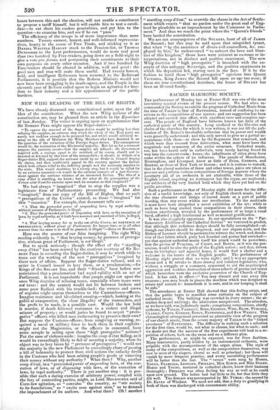SACRED HARMONIC SOCIETY.
THE performance of Monday last at Exeter Hall was one of the most interesting musical events of the present season. We had often re- commended the Society to exhibit the progress of Cathedral Music from the time of TaLus to that of BArnsam., instead of confining its ex- ertions to the compositions of one master; and our suggestion has been adopted and carried into effect, with excellent taste and complete suc- cess. The people of England have hitherto known but little of the cathedral music of this country. Long confined to the libraries and choirs of the churches for which it was written, it was not till the pub- lication of Dr. BOYCE'S invaluable collection that its power and wealth were generally understood : and this only served to give us a partial ac- quaintance with them—to show by the fragments that remained, and which were thus rescued from destruction, what must have been the magnitude and symmetry of the entire structure. Cathedral music, too, has been heard only in cathedrals, very rarely having found its way into the concert-room : hence, the inhabitants of cities alone have come within the sphere of its influence. The people of Manchester, Birmingham, and Liverpool, know as little of BYRD, GIBBONS, and ROGERS, as those of New York or Boston : and it is curious to remark, that in the choral societies of those and other towns, pains are taken to procure and perform various compositions of foreign masters where the necessary aid of an orchestra is not attainable, while those of the English school, requiring no instrument but the organ, are neglected; one evidence of the very limited hold which they have yet had on the public attention. Such a performance as that of Monday night did more for the diffu- sion of a useful knowledge, not only of English church music, but of the true character and design of sacred music as a part of public worship, than any event within our recollection. To the multitude it must have been altogether a novel exhibition of the art; while to such as have long studied these compositions in their closets, their various excellences, revealed by the performance of so large a vocal band, afforded a high intellectual as well as musical gratification. It was also singularly opportune. In our speculations on the "Par- liamentary Abolition of the Cathedral Service" we ventured to predict, that although this nefarious design should be fully accomplished—al- though our choirs should be dispersed, and our organs mute, and the Bishop of LONDON should be permitted to witness the wreck and desola- tion of that fabric which piety had founded and genius had enriched— yet that against cathedral music itself his attack would be powerless; that the genius of PURCELL, of CROFT, and BOYCE, as it was the pos- session, would be also the pride of the English nation ; and that, driven from its birthplace and especial home, it would find a shelter and a welcome in the hearts of the English people. The performance of Monday night proved that we were right : and it was an appropriate lesson and a fit rebuke to those drowsy and indolent legislators, who, without a struggle or a comment, consented to aid the unprincipled aggression and reckless destruction of those schools of genius and talent which heretofore were the exclusive possession of the Church of Eng- land. It has said, in effect—" You may discard and cast away this treasure ; you may break in pieces the machine which was designed to create and sustain it : henceforth it is ours, and in our keeping it shall be safe."
The attendance at Exeter Hall showed that this feeling exists, and that the public begin to manifest some curiosity on the subject of cathedral music. The building was crowded in every corner ; the at- tention deep and untiring; the admiration unequivocal. The selection, as we have said, was judiciously made ; comprising compositions, chiefly anthems, by TALUS, FARRANT, BIRD, GIBBONS, WISE, BLOW, PURCELL, e CLARKE, ROFT, GREENE, BOYCE, BATTISHILL, and SAM WESLEY. This chronological arrangement presented an admirable view of the progress of our church music, from the severe majesty of 'Luaus to the "linked sweetness" of BATTistin.L. The difficulty in making such a selection for the first time, would be, not what to choose, but what to Omit; and we doubt not that the success of the first experiment will lead to a re- petition of others, both on the same and on a different plan. The performance, as might be expected, was far from faultless. Many inaccuracies, partly hidden by an instrumental orchestra, were palpable with the accompaniment of the organ alone. The style of many of the compositions, as well as the compositions themselves, was new to most of the singers, choral as well as principal ; but these will vanish by more frequent practice, and every succeeding performance will be better than the last. The " verses " were sung by Hoinas, YOUNG, PEARSALL, LEFFLER, PHILLIPS, Miss BIRCH, and MISS DOLBY. Holm and YOUNG, nurtured in cathedral choirs, know their business thoroughly; PHILLIPS was often feeling his way as well as he could upon new ground. The ladies had but little to do, but that little they did well. The first act was accompanied by Mr. TURLE ; the second by Dr. ELVEY of Windsor. We need not add, that a duty so gratifying to both of them was discharged with consummate. ability.


























 Previous page
Previous page